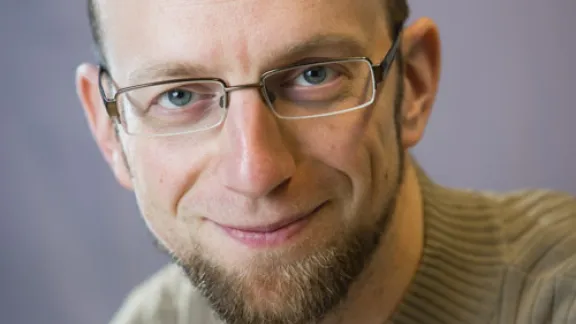
Dr. theol. Panu Pihkala (Lutheran Church of Finland) will present key themes from his extensive research on twentieth-century ecotheology. Photo: private
We encounter news about environmental destruction almost every day. What is our reaction? How do we cope with the situation?
Often it seems that people have become passive, perhaps even ignorant. Especially young people are asking: why doesn’t anyone care?
Many people actually care too much
New research in environmental psychology and sociology has revealed that people do actually care. They are only having a very hard time finding practical solutions. It often feels that there is not much to be done by individuals. In addition, group pressure makes it difficult for people to express their concerns: a person easily gets the reputation of ruining the atmosphere of social gatherings.
As a result, people resort to various forms of denial, disavowal and socially constructed silence. But anxiety is not removed by this: it is only repressed and continues to cause suffering.
In speaking about environmental issues – in other words, in environmental communication, education and advocacy – it is elementary to include both a sense of tragedy and a sense of hope. Because people deep down know the seriousness of the situation, an overly optimistic agenda is not credible. But in order to avoid paralysis, hope must be the main theme.
The Christian view of hope is not the same as optimism. It is not known whether many of our good efforts will succeed. But still we cling on to hope.
Historical views on hope, still relevant
I have found help from a peculiar place: ecumenical archives. Profound theologians struggled with hope at the 1954 World Council of Churches Assembly in Evanston, Illinois, USA, held under the theme “Christ – the Hope of the World.”
At the Seventh Assembly of The Lutheran World Federation (LWF) in Budapest, Hungary, in 1984, Lutherans discussed hope under the theme “In Christ – Hope for the world.” What has become forgotten is that already then, they linked this to environmental questions. The LWF urged Lutherans to proclaim the:
- “goodness of God’s creation and his continuing care for his world [citing Luther’s Catechism]
- irrevocable responsibility of human beings
- suffering of creation under the sin of humankind; and
- hope, not only for humankind but also for the totality of creation.”
(LWF Report 19/20, 241)
Practically the only things that need to be added today are a stronger focus on interconnections between human beings and nature, and sensitivity to eco-anxiety or the fear about environmental destruction. We, the current generation, stand in a long tradition which has wrestled with tragedy and hope.
Rev. Dr Panu Pihkala is a post-doctoral researcher at the University of Helsinki and an ordained pastor of the Evangelical Lutheran Church of Finland. His main field of study is ecumenics and systematic theology, but he combines elements from others disciplines such as environmental history, education and psychology. During a recent visit to the LWF Communion Office at the Ecumenical Center in Geneva, he presented key themes from his extensive research on theology and the environment in the 20th century.


